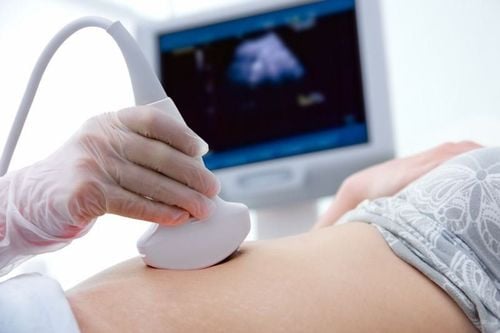This is an automatically translated article.
1. Brief about morning sickness during pregnancy
1.1 What is morning sickness? Morning sickness is a common condition in pregnant women in the first 3 months (mainly from 4-16 weeks). However, many women may experience morning sickness symptoms until delivery. Morning sickness includes symptoms such as nausea, vomiting, insomnia, loss of appetite,... In sensitive individuals, vomiting often occurs early, is severe and difficult to control. .
Until now, the cause of morning sickness during pregnancy is not clear. Many researchers believe that pregnancy changes the hormones of the gonads in the mother. Specifically, during pregnancy, the body produces a large amount of the hormone progesterone, which relaxes the digestive system muscles, causing food in the stomach to be pushed up into the esophagus, causing a feeling of nausea. In addition, the hormone progesterone also slows down digestion, causing indigestion.
However, during pregnancy, not all pregnant women have morning sickness. Pregnant women at high risk of morning sickness include:
Pregnant women for the first time; Pregnant women are overweight; People with a history of severe morning sickness in a previous pregnancy; Pregnant women with twins or multiples; Pregnant women with trophoblastic disease.

1.2 Typical symptoms Morning sickness symptoms can appear at any time of the day, especially when there is stimulation of the smell and taste of food such as meat, raw fish, ... will cause pregnancy Women feel nauseous and vomit. If a pregnant woman vomits too much, it can cause the body to become dehydrated. At the same time, pregnant women are also more sensitive to the smell of food, leading to loss of appetite and loss of appetite.
Not only that, many pregnant women also experience dizziness, lightheadedness, and weight loss because they can't eat, don't get enough nutrients. Therefore, they often suffer from fatigue, lack of energy and do not focus on work.
1.3 Classification of morning sickness Based on the severity of symptoms, morning sickness is divided into 2 types:
Common morning sickness: Found in 80% of pregnant women. During morning sickness, pregnant women often feel tired due to vomiting. However, vomiting occurs only in moderation, keeping food in the stomach, so pregnant women do not lose weight. At the same time, after about 12 - 20 weeks, the vomiting will gradually decrease; Severe morning sickness: About 1-1.5% of pregnant women experience severe morning sickness. During pregnancy, pregnant women often have vomiting, expel all food in the stomach, accompanied by symptoms of anorexia, losing up to 2-10kg. The body is weakened, so pregnant women often feel tired and dizzy. Severe morning sickness usually begins in the first 3 months of pregnancy and can last until delivery.
Trắc nghiệm: Chế độ dinh dưỡng 3 tháng đầu thai kỳ của mẹ bầu như thế nào?
3 tháng đầu được coi là giai đoạn phát triển quan trọng nhất của thai nhi. Để phát triển toàn diện, thai nhi cần được cung cấp đầy đủ dưỡng chất, đặc biệt là các vi chất cần thiết. Làm bài trắc nghiệm dưới đây sẽ giúp bạn có thêm kiến thức về chế độ dinh dưỡng trong 3 tháng đầu thai kỳ.The following content is prepared under supervision of Bác sĩ chuyên khoa I, Lê Hồng Liên , Sản phụ khoa , Khoa Sản phụ khoa - Bệnh viện Đa khoa Quốc tế Vinmec Central Park
2. Does inability to eat morning sickness affect the fetus?
In the early stages, the fetus should receive nutrients from the mother through the placenta. Therefore, a pregnant woman's diet plays a very important role in the development of the fetus. Morning sickness is normal in pregnancy, but morning sickness is vomiting, severe morning sickness can't have a good effect on the health of mother and baby.

Specifically, pregnant women who can't eat anything or vomit after eating will have a nutritional deficiency, leading to weight loss. Accompanying that is the loss of stomach acid due to vomiting, causing dehydration and electrolyte imbalance in pregnant women. If severe morning sickness persists without intervention and treatment, both mother and baby may face the risk of some dangerous complications such as malnutrition, premature birth,...
3. Measures to control severe morning sickness can not eat anything?
When vomiting occurs continuously, lasts and cannot be controlled, pregnant women should immediately go to a medical facility to check the pregnancy status. Your doctor will take blood and urine samples to assess the risk of dehydration or test for problems with your digestive system because this is most likely the cause of nausea and vomiting.
Besides, the doctor also appoints an ultrasound to check if the pregnant woman is pregnant with multiples or has a tumor in the uterus. When the test results are available, the doctor will make a diagnosis and plan to reduce morning sickness for pregnant women.
To overcome morning sickness, pregnant women can apply the following measures:
Avoid contact with foods with irritating flavors such as raw meat, raw fish,...; Drink water regularly because vomiting makes pregnant women dehydrated. When drinking water, take small sips and drink it between meals to prevent nausea; Get enough sleep and get plenty of rest to reduce fatigue, avoid stress and anxiety;

Split meals during the day, do not leave the stomach empty because it will increase the feeling of nausea. During meals, pregnant women should eat foods rich in fiber, low in sugar and low in fat. In order to provide enough nutrients for the fetus, pregnant mothers should prioritize protein-rich foods such as eggs, milk, meat,... Green vegetables, fruits, whole grains, calcium-rich foods, etc. be added more to the pregnant woman's diet; Breakfast should not be skipped, should be eaten in combination with frugal, easy-to-digest dishes such as salty biscuits, ginger juice, yogurt,...; Avoid spicy foods, high-fat foods, indigestible foods; Use products with ginger ingredients such as ginger tea, ginger candies,... to reduce nausea and vomiting; Apply methods of massage, acupuncture, acupressure, ... to reduce the feeling of nausea; You can use some antihistamines prescribed by your doctor to reduce vomiting (for pregnant women with severe morning sickness). Morning sickness makes pregnant women tired and uncomfortable, greatly affecting the activities, work and health of both mother and baby. Therefore, pregnant women need to pay attention to avoid factors that cause vomiting, try to eat more and consult a doctor to ensure good health so that the mother is healthy and the baby develops comprehensively.
Vinmec International General Hospital offers a Package Maternity Care Program for pregnant women right from the first months of pregnancy with a full range of antenatal care visits, periodical 3D and 4D ultrasounds and routine tests to ensure that the mother is healthy and the fetus is developing comprehensively. Pregnant women will no longer be alone when entering labor because having a loved one to help them during childbirth always brings peace of mind and happiness.
Please dial HOTLINE for more information or register for an appointment HERE. Download MyVinmec app to make appointments faster and to manage your bookings easily.














